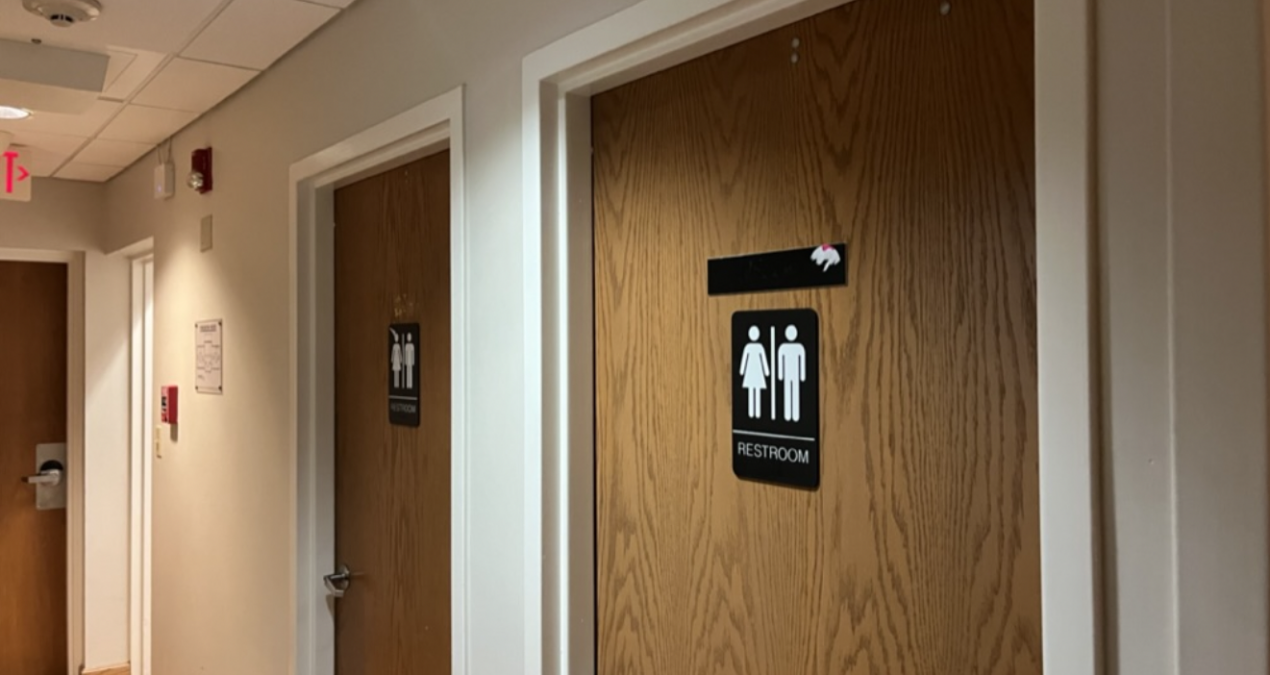Katie Houpt, Special to The Denisonian–
Beginning on Feb. 25, some Denison students will have to think twice before using the restroom. This is the day Senate Bill 104 will go into effect in Ohio.
Informally known as the “bathroom bill,” Senate Bill 104 (SB-104) requires that all students in the state of Ohio use the restroom that aligns with their gender assigned at birth. For transgender and gender fluid individuals at Denison, this means they may be required to enter a new restroom when the law takes effect next week.
Denison must comply with the “bathroom bill,” but what will this compliance look like?
The bill’s text offers no clear guidelines for enforcement. Instead, each school in the state is left to administer the bill at their own discretion.
“There’s absolutely no bathroom police,” said Dr. Ricardo Hall, Vice President of Student Life at Denison University.
While it is the administration’s responsibility to have clear restroom signage and availability, enforcement of the bill falls upon the Denison community. The administration will rely on students to adhere to the law on their own. Cases of non-compliance will only occur if reported by another individual.
Eliana Lazzaro ‘26, the cross-cultural community liaison for Outlook, Denison’s queer-straight alliance, believes the bill’s unclear enforcement structure can have broader impacts.
“When you create an environment where someone’s biological sex can be questioned in public and that there can be ramifications on the individual… it creates a general culture of suspicion,” said Lazzaro.
Lazzaro identifies as non-binary and gender-queer. They note that they don’t feel uncomfortable using the restroom of their gender assigned at birth. Nevertheless, the bill still has a deep impact on them.
“These types of bills create a general culture of scrutiny and suspicion along gender and biological sex and that’s something that I think fundamentally impacts anyone in the trans community, even if the specific regulation doesn’t have a strong effect on you,” Lazzaro said.
Students who are impacted by this bill can still use single occupancy gender-neutral restrooms. While all multi-occupancy restrooms are required to be assigned a gender, single occupancy restrooms may still remain gender-neutral.
Ant Smith ‘27, president of Outlook, cites a key concern of her organization is ensuring these gender-neutral restrooms are widely available and that students who need to use them know where they are located.
Toward the end of the Fall 2024 semester, Denison completed a campus-wide inventory of these restrooms. Currently, 57 out of 64 major buildings on campus have single occupancy gender-neutral restrooms. The seven buildings without these restrooms are Barney Davis, Beta House, Curtis Dining, Curtis East, Herrick Hall, Higley Hall, and Lamson Lodge.
According to Jake Preston, director of physical plant and capital projects at Denison, when renovations or facility updates occur, the university aims to broaden access to single occupancy gender-neutral restrooms.
“One of the ultimate goals is to just have facilities on campus where folks feel safe,” said Hall. “They’re entering private spaces but at the same time they don’t have to think twice about it or that someone is scrutinizing them or that they’re restricted from a space on campus.”
Both Lazzaro and Smith note that students, faculty, and staff are generally very accepting of students’ gender and sexual identities.
Earlier this year, Outlook hosted an educational town hall about SB-104. On Jan. 30, the organization gathered in Slayter Auditorium along with fellow students, faculty, and staff to discuss with and learn from a variety of panelists. These panelists included members from the Title IX office at Denison, Residential Communities and Housing at Denison, Equality Ohio, Honesty for Ohio Education, and Kaleidoscope Youth Center.
Despite this town hall, both Hall and Smith have heard very minimal chatter about the ramifications of SB-104 among the general student population.
Hall encourages any students experiencing discomfort and confusion to bring their concerns to him, his staff, or Denison Campus Governance Association (DCGA). “I think the university wants to make sure that we are appropriate in our compliance and sensitive to the potential that there are concerns that aren’t being voiced,” said Hall.
For Lazzaro and Smith, their concerns are bigger than Denison.
“It kind of does make you feel a little bit more cautious about expressing your gender identity in public,” said Lazzaro.

